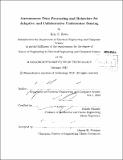Autonomous data processing and behaviors for adaptive and collaborative underwater sensing
Author(s)
Rowe, Keja S
DownloadFull printable version (4.906Mb)
Other Contributors
Massachusetts Institute of Technology. Dept. of Electrical Engineering and Computer Science.
Advisor
Henrik Schmidt.
Terms of use
Metadata
Show full item recordAbstract
In this thesis, I designed, simulated and developed behaviors for active riverine data collection platforms. The current state-of-the-art in riverine data collection is plagued by several issues which I identify and address. I completed a real-time test of my behaviors to insure they worked as designed. Then, in a joint effort between the NATO Undersea Research Center (NURC) and Massachusetts Institute of Technology (MIT) I assisted the Shallow Water Autonomous Mine Sensing Initiative (SWAMSI)'11 experiment and demonstrated the viability of multi-static sonar tracking techniques for seabed and sub-seabed targets. By detecting the backscattered energy at the monostatic and several bi-static angles simultaneously, the probabilities of both target detection and target classification should be improved. However, due to equipment failure, we were not able to show the benefits of this technique.
Description
Thesis (M. Eng.)--Massachusetts Institute of Technology, Dept. of Electrical Engineering and Computer Science, 2012. Cataloged from PDF version of thesis. Includes bibliographical references (p. 73).
Date issued
2012Department
Massachusetts Institute of Technology. Department of Electrical Engineering and Computer SciencePublisher
Massachusetts Institute of Technology
Keywords
Electrical Engineering and Computer Science.